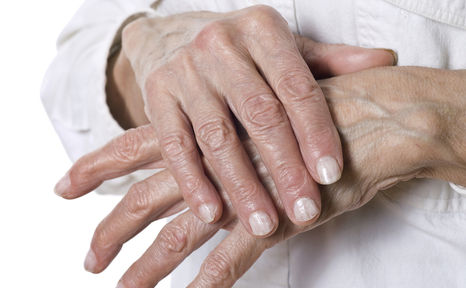

Whether it's the result of nerves or sheer boredom, cracking knuckles has long been a common way to pass the time.

Many view this production of popping noises as an innocent bodily percussion, others claim it may provoke symptoms of arthritis. After decades of debate, the question still remains: Does cracking knuckles actually cause arthritis?
While many people can crack their knuckles, it's likely that the majority of them have no idea what is actually occurring in their hands. It's actually quite a fascinating process. It all starts with the synovial fluid found between all joints in your body. Synovial fluid is contained in a tiny bag or bubble that becomes stretched out every time you try to crack your knuckles.
Once you've stretched the joint out far enough, the bubble pops, releasing a tiny amount of carbon dioxide that also prompts the loud cracking sound. It tends to take 10 to 15 minutes for the bag to refill with synovial fluid, which is why repeated cracking of knuckles is usually difficult.
The purported link between cracking knuckles and symptoms of arthritis primarily stems from folk tales, but there has been plenty of scientific research conducted to help put these rumors to rest. One of the initial studies that attempted to answer this theory was performed in 1990 by researchers from Mount Carmel Mercy Hospital in Detroit. Using 300 patients aged 45 or older, the colleagues divided the subjects into two groups: knuckle-crackers, and individuals who never cracked their knuckles. The study discovered several health-related characteristics in the knuckle-crackers, such as an increased likelihood of hand swelling and lower grip strength. But there was no sign that arthritis risk increased for those who cracked their knuckles.
In the years since, more evidence continued to accumulate, corroborating the Detroit researchers' conclusion that there is no connection between cracking knuckles and arthritis. Institutions ranging from Harvard Medical School to the NYU Langone Medical Center have agreed that while cracking your knuckles may not be the healthiest choice for passing time, it won't raise your risk of arthritis.
While knuckle-crackers may sigh in relief at the dismissal of arthritis as a potential risk, there's still medical evidence that the popping pastime isn't healthy. According to Johns Hopkins Medicine, knuckle cracking has been linked to injuring ligaments and tendons within the hand, as well as a significant reduction in grip strength over time. Other reports have indicated that those who crack their knuckles are more likely to drink alcohol and smoke cigarettes in excess, as well as bite their nails. These are just a few of the reasons why it's always a good idea to stop cracking your knuckles.
Copyright © www.orthopaedics.win Bone Health All Rights Reserved